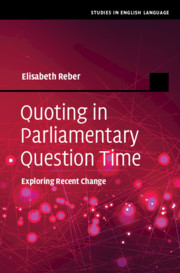Book contents
- Quoting in Parliamentary Question Time
- Studies In English Language
- Quoting in Parliamentary Question Time
- Copyright page
- Contents
- Figures
- Tables
- Acknowledgements
- Abbreviations
- Chapter 1 Introduction
- Chapter 2 Reported Speech and Evidentiality
- Chapter 3 Prime Minister’s Questions
- Chapter 4 Data, Transcription, and Methodology
- Chapter 5 Reporting Clauses
- Chapter 6 Reported Clauses
- Chapter 7 Reported Speech and Rhetorical Structures
- Chapter 8 Reported Speech in Recurrent Courses of Action
- Chapter 9 Summary and Conclusions
- Book part
- References
- Index
Chapter 2 - Reported Speech and Evidentiality
Published online by Cambridge University Press: 27 August 2021
- Quoting in Parliamentary Question Time
- Studies In English Language
- Quoting in Parliamentary Question Time
- Copyright page
- Contents
- Figures
- Tables
- Acknowledgements
- Abbreviations
- Chapter 1 Introduction
- Chapter 2 Reported Speech and Evidentiality
- Chapter 3 Prime Minister’s Questions
- Chapter 4 Data, Transcription, and Methodology
- Chapter 5 Reporting Clauses
- Chapter 6 Reported Clauses
- Chapter 7 Reported Speech and Rhetorical Structures
- Chapter 8 Reported Speech in Recurrent Courses of Action
- Chapter 9 Summary and Conclusions
- Book part
- References
- Index
Summary
Chapter 2 offers an extensive literature review of reported speech and evidentiality, and introduces the relevant terms and concepts of the study. It describes reported speech as the object of study and positions the study in the field of evidentiality. In keeping with the diachronic, usage-based nature of the monograph, the chapter makes a case for viewing reported speech as a construction and briefly discusses its potential for entering processes of grammaticalisation. Revisiting the debate whether quotations represent constructed or reconstructed utterances, the chapter examines the notions of 'literalised' direct speech (Rumsey 1992) and 'constructed dialogue' (Tannen 2007) as relevant descriptive labels for reported speech in political speech. Due to the analytic interest of the study, a focus is placed on accounts made for English.
Keywords
Information
- Type
- Chapter
- Information
- Quoting in Parliamentary Question TimeExploring Recent Change, pp. 12 - 25Publisher: Cambridge University PressPrint publication year: 2021
